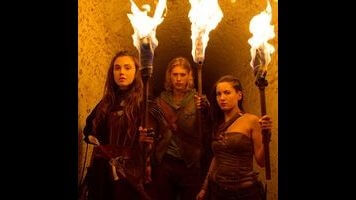The Shannara Chronicles is the fantasy drinking game you hoped it would be

Oh, weary traveler, if you’ve come here in search of answers about the ancient prophecy that foretold a fantasy show secretly designed to be drinking game, rest your feet; you found it.
The Shannara Chronicles arrives under some fascinatingly specific pop-culture conditions, which at first sound like a bulletproof pitch but become an increasingly self-defeating set of strictures the more of them you add. It’s based on an iconic and iconically lengthy interconnected series of fantasy books that positively floats on franchise security. It’s a fantasy adventure in a television age with an attention span short enough to have forgotten Legend Of The Seeker but long enough to remember the thrill of Game Of Thrones’ first season. The Lord Of The Rings trilogy can do all the subconscious visual heavy lifting a world with elves requires, and is probably a difficult aesthetic to avoid for a show that made the most of outdoor shoots in New Zealand. (A touch of elven filigree against breathtaking landscapes? Take a drink!) And the show’s timeline happens to be a casually post-apocalyptic future that provides plenty of opportunity to borrow from The 100 and its mossy, plot-heavy woods. (See a contemporary contraption treated like a relic? Take a drink!)
Unfortunately, a show that borrows so liberally from both Lord Of The Rings and The 100 is asking to be compared to one of the biggest fantasy epics ever put on screen, and a young-adult critical darling driven firmly by characters facing wrenching choices and consequences that are far-reaching and morally gray. And if The Shannara Chronicles wants to be either epic or complicated, it’s going to have to try harder than it does in the opening episodes of the season.
Part of the problem, of course, is the material it’s got to work with. Shannara is a hugely influential series, but streamlining it for the screen highlights the distinctly Dungeons And Dragons nature of the many obstacles facing its overly familiar and achingly white fantasy world. The central trio sets the tone for everything that follows: Elf princess Amberle (Poppy Drayton) fights to become one of the Chosen, assigned to watch over Ellcrys, the magical tree that everyone but her grandfather assumes is symbolic. Half-elf Wil (Austin Butler) escapes his suspiciously lowly and unremarkable upbringing only to run into a Druid (a suitably stern Manu Bennett) who reveals his destiny as a royal heir. And the most promisingly complex of the three, Eretria (Pan’s Labyrinth’s Ivana Baquero, skirting the “skill level or material?” post-child actor conundrum), is the rogue thief who provides about 60 percent of the cynicism and the obligatory 33 percent of the love triangle. (They all maintain their MTV complexion perfection, even in the deepest woods.) Unfortunately, the plot overtakes nearly any attempts to create convincing dynamics. At times it’s hard to blame them: “I’ve had enough of this magician’s cryptic announcements!” is tough enough work while also trying to develop subtext. It’s perhaps not surprising that the cast never finds a moment to click into an ensemble. (If someone sounds like they’re reading noun soup from a cue card, take a drink!)
Still, there are some performances that rise from the mist like promises from a version of the show that may yet come to pass, in which Shannara accepts the inherent cheesiness of its premise and gets comfortable somewhere between self-serious and camp. John Rhys-Davies, who at this point might just be showing up on fantasy sets until someone employs him, delivers an Elf King with the perfect level of ponderous self-awareness for someone withholding crucial intel simply to hold back the plot, matched only by James Remar as the king of thieves, a major subplot provider who’s suspiciously handsy with his adoptive daughter. Actually, despite everyone in the love triangle giving it the old college try, the only romantic tension comes from left field and tends to have awkward family angles. (Incestuous undertones? Take a drink!)
And though much happens in the first four episodes, a lot of the action is the show working overtime to establish its world and set up the various stopgap stakes facing the heroes as they reluctantly but inevitably come together to complete the quest before them. (The corrupted Druid whose demonic powers provide several major plot points won’t be free to walk the earth until the last leaf has fallen from the Ellcrys, but his many spies are—eh, just take a drink.) It all circles back to what’s clearly the real starting point for the action, and much of how the show develops its identity beyond the long shadow of its betters will hinge on the season’s second act.
And that much can be said for Shannara; despite all odds, it actually strives endlessly for the identity it wants, even against its own best interests, committing at face value to the adolescent earnestness both of its characters and its text. While it would be more visually appealing to let the gorgeous scenery convey a sense of place or mood, the show commits to its prophetic set pieces. But damn if The Shannara Chronicles isn’t earnest about what it’s doing; it’s going to fantasy the living hell out of itself or die trying. And though there’s plenty of reasons to mourn a show that’s covering up its central emptiness with so much narrative busy work, there are glimmers of hope that maybe, if the show gains some footing in its second act, it might still find itself in time. (Quest metaphors? For heaven’s sake, drink.)